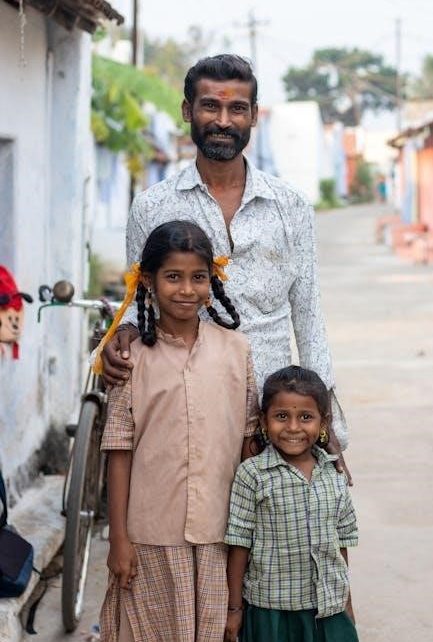Village parenting emphasizes community collaboration‚ safety‚ and collective well-being. It fosters a supportive environment where neighbors and local resources work together to ensure children’s holistic development and happiness.
Understanding the Village Environment
Understanding the village environment is crucial for parents aiming to create a safe and nurturing space for their children. Villages often offer a close-knit community setting‚ where neighbors know one another‚ fostering a sense of belonging and shared responsibility. However‚ village environments can also present unique challenges‚ such as limited access to urban amenities or the need to navigate local customs and traditions.
Parents should be aware of the surroundings‚ including natural elements like woods or open spaces‚ which can be both a source of adventure and potential safety concerns. The village’s isolation may require additional vigilance to ensure children’s safety while allowing them to explore and grow independently. Building relationships with local families and community leaders can provide valuable support and resources.
Moreover‚ understanding the village environment involves appreciating its cultural and historical context‚ which can enrich a child’s upbringing. By balancing supervision with freedom‚ parents can help their children thrive in this unique setting. This understanding is key to harnessing the village’s strengths while addressing its challenges.
Building a Supportive Community
Building a supportive community is at the heart of village parenting‚ where collaboration and mutual assistance create a nurturing environment for children. Parents can foster connections by engaging in local initiatives‚ such as parent groups or community events‚ which encourage shared responsibilities and collective well-being.
Local customs and traditions often play a significant role in strengthening these bonds. For instance‚ village fairs or cultural celebrations can serve as platforms for families to come together‚ fostering a sense of unity and cooperation. Additionally‚ many villages have established systems where neighbors look out for one another‚ providing informal support networks for parents.
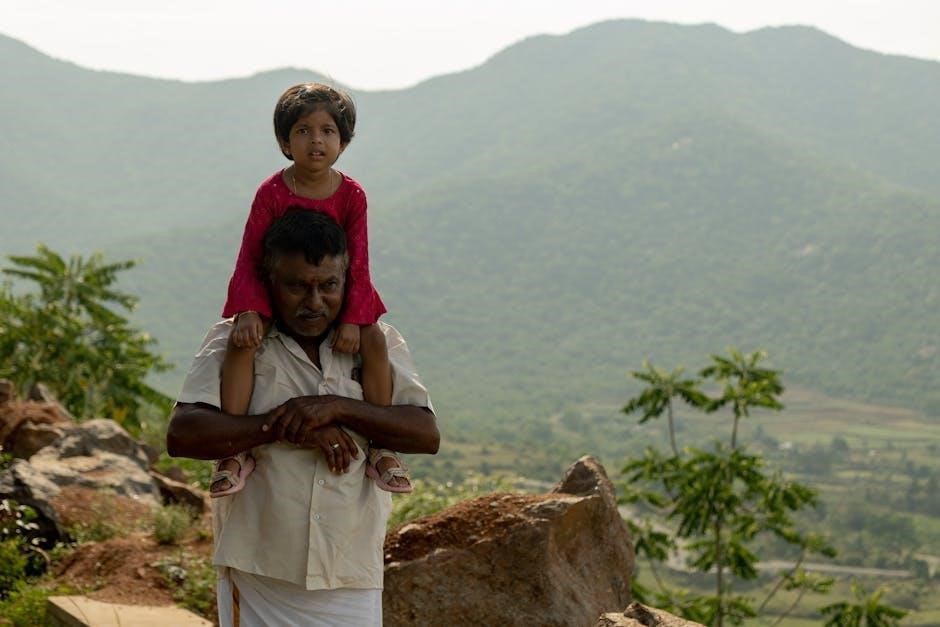
Encouraging open communication and active participation in community activities helps build trust and solidarity. By working together‚ parents can create a safe‚ inclusive‚ and supportive environment that benefits all families. This collaborative approach not only enhances the quality of life for children but also strengthens the village as a whole.
Navigating Local Customs
Navigating local customs is essential for parents in a village setting‚ as these traditions often shape the community’s identity and daily life. Understanding and respecting these customs fosters harmony and helps families integrate smoothly into the village environment.
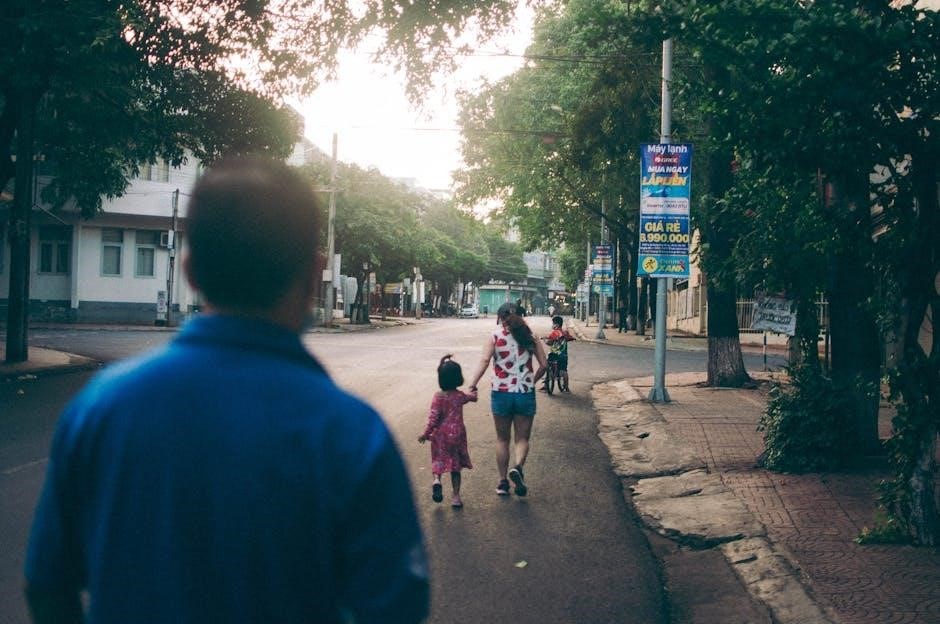
Many villages have unique traditions‚ such as seasonal festivals or specific social etiquette‚ which play a significant role in fostering a sense of belonging. Parents should encourage their children to participate in these events‚ as they provide opportunities for cultural enrichment and social bonding.
Additionally‚ being mindful of local norms‚ such as dress codes or community gatherings‚ can help parents avoid misunderstandings. Seeking guidance from local leaders or long-time residents can also provide valuable insights into navigating these customs effectively. By embracing and respecting these traditions‚ parents can create a positive and inclusive experience for their families within the village community.
Outdoor Activities
Village parenting often highlights the importance of outdoor activities for children‚ offering a wide range of opportunities to explore nature and build physical and mental resilience. Many villages provide access to nature trails‚ parks‚ and open spaces‚ perfect for hiking‚ biking‚ or simply playing.
Summer camps and outdoor programs are popular‚ offering structured activities that emphasize teamwork‚ creativity‚ and environmental awareness. These programs often include sports‚ arts‚ and crafts‚ allowing children to develop new skills while enjoying the outdoors.
The village environment also fosters a sense of adventure and curiosity‚ encouraging children to connect with their surroundings. Parents can participate in these activities alongside their kids‚ creating meaningful family bonding experiences. Outdoor activities in a village setting not only promote physical health but also contribute to emotional well-being and a deeper appreciation for nature.
Safety Tips
Ensuring children’s safety is a top priority in village parenting. Parents are encouraged to supervise their kids during outdoor activities and teach them about potential hazards in the village environment. Awareness of surroundings‚ such as traffic or wildlife‚ is crucial.

Village camps and programs often have strict safety protocols in place‚ including staff training and emergency preparedness. Parents should review these guidelines and communicate openly with organizers to ensure their child’s well-being.
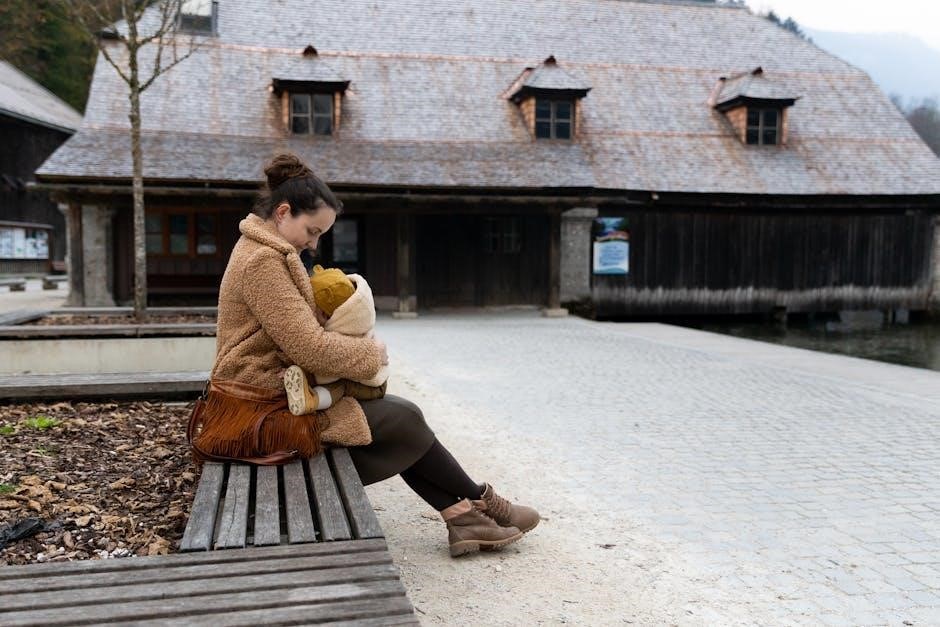
Clear communication between parents and village authorities is key to maintaining a safe community. Regular updates on local conditions‚ such as weather alerts or safety drills‚ help parents stay informed and proactive.
By fostering a culture of vigilance and cooperation‚ village parenting ensures a secure and nurturing environment for children to thrive.
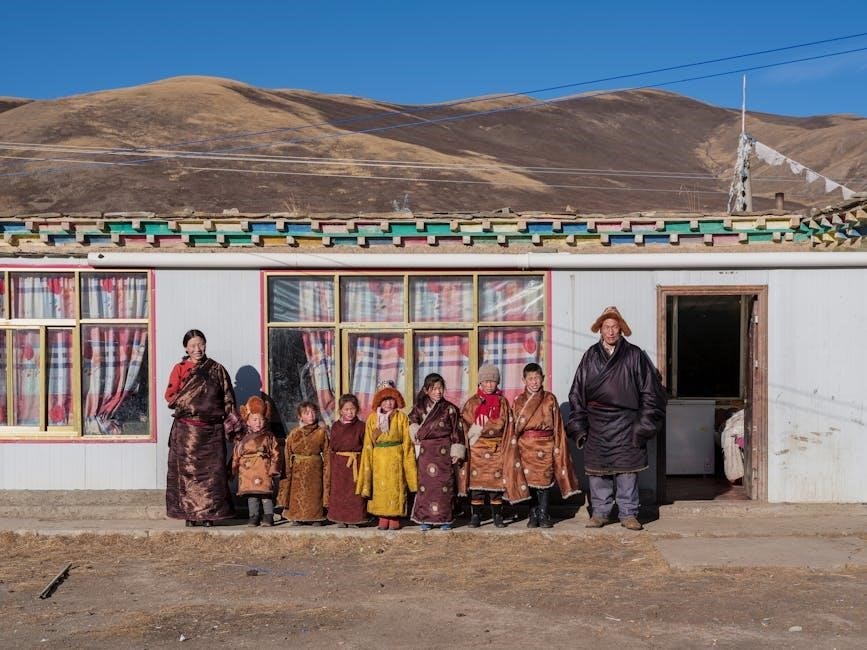
Resources for Parents
Village parenting offers a supportive community with access to schooling‚ health services‚ and extracurricular activities. Parents can rely on local resources and communication channels to ensure their children’s well-being and development.
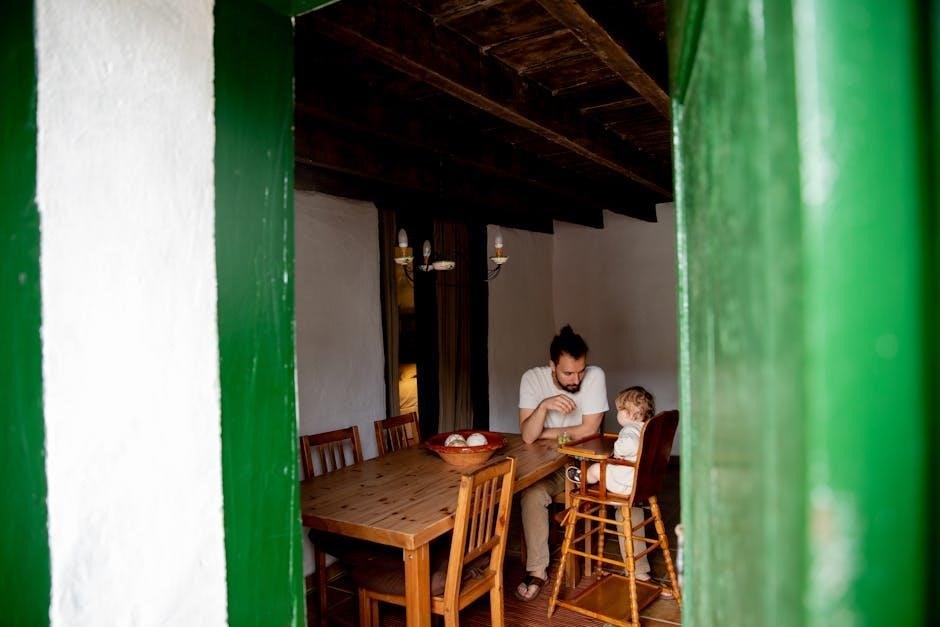
Schooling Options

Village communities often provide diverse schooling options tailored to meet the unique needs of children. From local primary schools to international programs‚ parents can choose between public‚ private‚ and specialized education pathways. Many villages offer access to International Baccalaureate programs‚ STEM-focused curriculums‚ and language immersion opportunities. Additionally‚ some villages have partnerships with nearby cities‚ enabling families to balance rural life with urban educational resources. Summer camps and extracurricular activities further enrich learning experiences‚ fostering creativity and skill development. Parents are encouraged to engage with school boards and teachers to ensure their children receive personalized attention. The village environment also promotes a sense of community‚ with neighbors often supporting one another in educational endeavors. This collaborative approach ensures that children thrive academically and socially‚ benefiting from both traditional and modern schooling options.
Health Services
Access to reliable health services is a cornerstone of village parenting‚ ensuring children receive quality care in a supportive environment. Many villages have local clinics or partnerships with nearby hospitals‚ offering routine check-ups‚ vaccinations‚ and emergency services. Parents can rely on community health workers who provide guidance on nutrition‚ mental health‚ and wellness. Some villages also host regular health fairs and workshops‚ fostering awareness and preventive care. Telehealth services are increasingly available‚ connecting families with specialists remotely. The tight-knit community often rallies around families during health challenges‚ offering practical support. With a focus on holistic well-being‚ village health services aim to promote physical‚ emotional‚ and mental health for children and parents alike‚ creating a safe and nurturing environment for all.
Extracurricular Activities
Village parenting often highlights the importance of extracurricular activities in fostering a child’s development. Many villages offer a variety of programs‚ such as sports‚ art‚ and language classes‚ designed to engage children and help them grow. Summer camps and activity clubs are popular options‚ providing structured settings for kids to learn new skills and build friendships. These programs often emphasize teamwork‚ creativity‚ and physical fitness‚ while also encouraging social interaction. Parents can find activities tailored to their child’s interests‚ from music lessons to outdoor adventures. The close-knit community ensures that these programs are accessible and supportive‚ with many volunteers and local organizations contributing to their success. By participating in extracurricular activities‚ children gain confidence‚ develop new talents‚ and benefit from a sense of belonging within the village. These experiences play a key role in shaping well-rounded individuals‚ making village life a nurturing environment for growth and exploration.
Parental Involvement
Parental involvement is a cornerstone of village parenting‚ where parents actively collaborate with educators and the community to support their children’s growth. This approach fosters a strong sense of responsibility and mutual respect‚ ensuring that children thrive in a nurturing environment. Parents are encouraged to participate in school meetings‚ volunteer in classrooms‚ and engage in local initiatives that promote learning and development. By staying involved‚ parents can guide their children’s academic and personal progress while building lasting connections with the community. This collaborative effort not only enhances a child’s education but also strengthens the overall village bonds‚ creating a supportive network for families. Active parental involvement is seen as a vital component of raising well-rounded individuals who are prepared to contribute positively to their community. Through shared efforts‚ parents and educators can work together to create a holistic and enriching experience for all children.
Communication with Schools
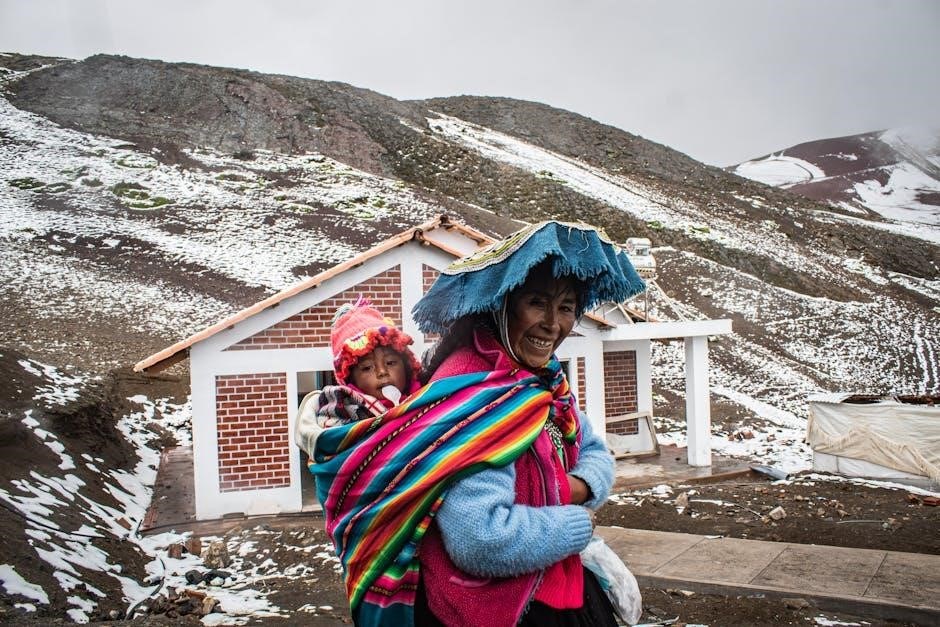
Effective communication between parents and schools is vital for a child’s educational success. Regular updates on academic progress‚ behavior‚ and upcoming events ensure parents are actively involved in their child’s learning journey. Schools often use newsletters‚ emails‚ and parent-teacher meetings to keep families informed. Open dialogue fosters trust and collaboration‚ allowing parents to address concerns and support their child’s needs. Many villages have implemented digital platforms for real-time communication‚ making it easier for parents to stay engaged. Encouraging transparency and active participation‚ these tools help create a cohesive environment where educators and parents work together for the child’s benefit. By maintaining clear and consistent communication‚ schools and parents can align their efforts to provide the best possible education and support for children. This partnership is essential for fostering a child’s academic and personal growth within the village community.
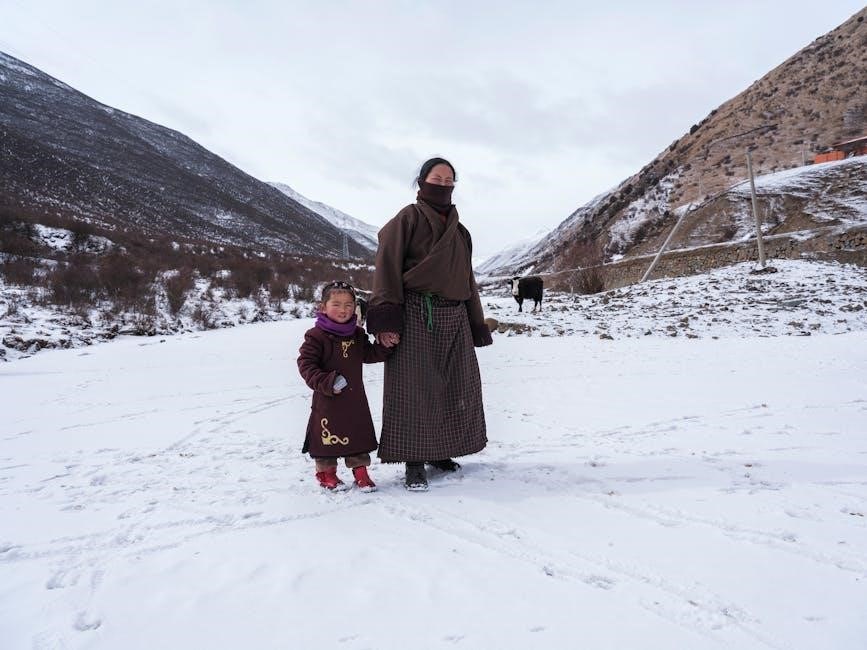
Social Activities
Social activities play a crucial role in fostering a sense of community and connection among parents in a village setting. Regular events such as parent groups‚ potluck dinners‚ and outdoor gatherings provide opportunities for families to bond and share experiences. These activities help reduce feelings of isolation and create a supportive network where parents can exchange advice and resources. Many villages organize seasonal festivals‚ fairs‚ and recreational programs that encourage participation from both children and adults. Such events not only strengthen relationships but also promote cultural awareness and teamwork. Additionally‚ local clubs and workshops focused on hobbies like gardening‚ cooking‚ or crafts offer platforms for parents to engage in shared interests. By actively participating in these social activities‚ parents can build lasting friendships and contribute to a vibrant‚ inclusive community that benefits everyone. These connections often lead to a stronger sense of belonging and a more collaborative approach to parenting within the village.
Village Events
Village events are a cornerstone of community life‚ offering opportunities for families to connect and celebrate together. From seasonal festivals to outdoor fairs‚ these gatherings foster a sense of belonging and shared joy. Many villages organize annual events like harvest festivals‚ Christmas markets‚ or summer fairs‚ which often include games‚ food‚ and entertainment for all ages. These events provide a platform for local talent‚ showcasing music‚ art‚ and crafts. Additionally‚ villages may host cultural or educational workshops‚ teaching traditional skills or celebrating local heritage. Parents can engage in these activities alongside their children‚ creating lasting memories. Village events also serve as a space for fundraising‚ supporting local schools or community projects. By participating in these events‚ families contribute to the vibrancy of their community and strengthen social bonds. Such gatherings are essential for building a cohesive and supportive environment‚ making village life enriching and fulfilling for everyone involved.
